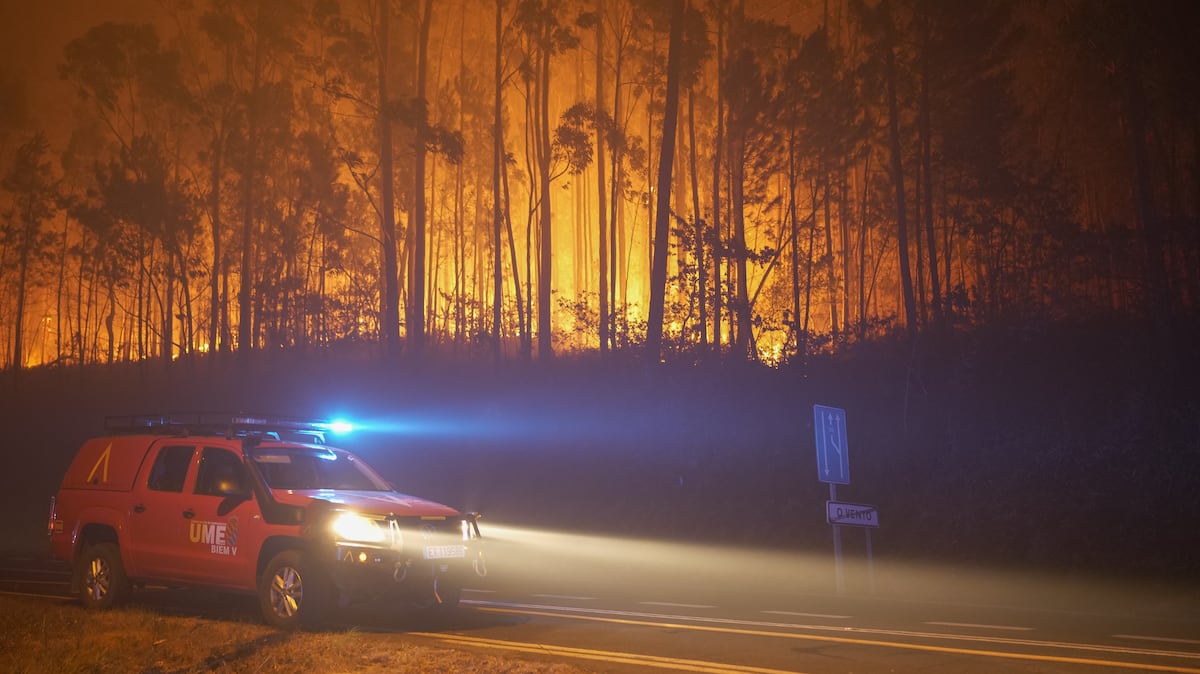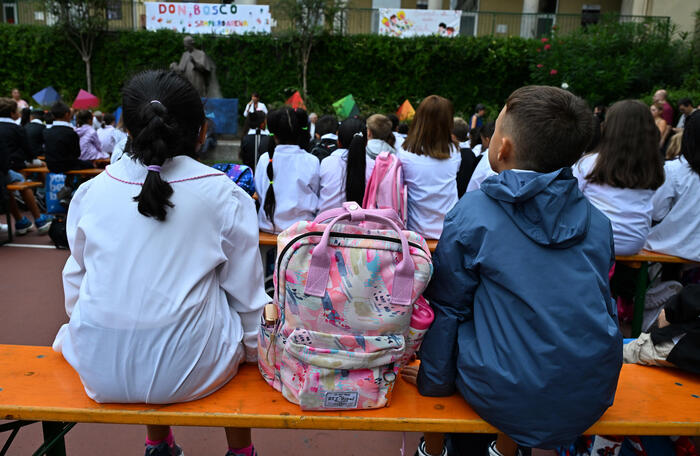Firefighters vehicle in the vicinity of a fire in the town of Villagracia de Arousa (Galicia), on August 4. Europa Press News (Europa Press via Getty Images)
In this long summer, two things changed our lives perhaps forever, including the way we do politics: the climate crisis and the bloody whims of Vladimir Putin.
The overwhelming heat has forced us to develop a consciousness somewhat removed from the story of progress, and to relocate to a planet that we share with other creatures, where knowing how to relate will be a matter of life or death.
Optimists say the gap between environmental elites and popular consciousness is finally disappearing.
We will see, but on the other hand, Putin's dilemma also speaks to us of precariousness, of the urgency of politics to anticipate and work with diverse scenarios.
Can we do it without falling into the panic of uncertainty,
in the melancholy of a world experienced only from loss?
We intimately live the threats linked to climate change, to pandemics, and we feel, whether we like it or not, the geopolitical uncertainties.
It is at the heart of our daily concerns.
It concerns us and affects us.
None of this is foreign to our country.
Spain has also experienced its particular version of last summer, the summer of the end of recklessness.
To explain this almost violent shock to us, the newspaper
Le Monde
used the Camino de Santiago, where pilgrims and hikers were surprised by the transformations of the landscape.
Those who told it, believers or not, had traveled part of the way and explained it as if they had felt a slap in the face, almost a mystical revelation.
Sun-baked lentils, lack of fresh grass for the cattle, dying streams overrun with dead leaves.
At his side, the tensions over the price of oil and gas caused by the war are just a foretaste of the many profound changes, personal and collective, that the fight against global warming will require now.
The royal decree with urgent measures for energy saving approved on August 22 brought forward the start of the political course, condensing in itself all these crises and proposing that we reconsider our individual and collective lives, that we make an effort in consumption in the face of the turbulence of the war in Ukraine.
It is a kind of landing
made in Spain
of what our daily politics will be in this change of era or
Zeitenwende
, as advocated for the continent by Olaf Scholz.
But the government is fragile and insists on acting alone, without dialogue or even having listened to its parliamentary allies, let alone the opposition or the autonomous communities.
There is a risk of hardening in an opposition swollen by the advantage of almost nine points in the polls;
once again, the colonization of politics by electoral logic, 14 months before the foreseeable call for the general elections.
All the political actors are already taking out their ammunition, willfully blind to the urgent needs of a time, this one, where competitive dynamics should decline and other ways of doing politics should be tried, based on the agreement on the great issues of State.
Our main challenges concern energy and climate policy,
to the social measures to deal with the rising costs of energy and inflation, to the peremptory renewal of some institutions brutalized by a partisan instrumentalization that has ended up emptying their public service vocation of substance.
Unfortunately, the regional and local elections next spring will fade any hope of an understanding between the government and the opposition.
We don't learn.
Autumn will be hot: the unions are preparing mobilizations to demand a general salary increase that contains inflation.
Spain is no different from its neighbours: in Manchester Cathedral, the unions are talking about a strike and holding rallies under the slogan “Enough is enough!”
while the news arrives of a new rise in electricity, 80% for October 1.
In France, workers' organizations announce mobilizations while President Macron declares the "end of abundance".
The general secretary of the General Confederation of Labor replied that, for many French, "the sacrifices were already there."
If populism appears when our traditional representatives fail to channel representation, at least let us celebrate that, for now, they are not the
yellow vests
or any other crowd electrified by despair who uncover a malaise that would otherwise be much more difficult to decipher.
We must give a face to the protest.
And yet, the moment is delicate.
How to combine good government with electoralism that will move the players to put on and take off the hat of candidate or institutional position as appropriate?
The energy and climate fronts, together with the inevitable social and international agenda, will paradoxically give Spain a kind of temporary superpower when it holds the rotating presidency of the European Council in the second half of 2023. Spain can take advantage of a formidable moment to settle its European leadership, now that Italy is suddenly removed from the equation.
Sánchez, as Macron did at the time, will try to get the most out of the presidency, also electoral.
As for the energy, climate and social vertices, the Government would do well to approach them from the pedagogy of the crisis and social sensitivity.
Nothing will be like before and we all need to find a political language to say it.
France speaks of “sobriety”,
trying to reconnect citizens with energy savings and the changes in life that climate change brings.
But the discourse on the consequences for the planet must be parallel to the focus on inequality.
There is a conservative right that is increasingly colonized by the marginality of its extremes, and it will be reluctant to this shared political narrative.
It doesn't matter: the European political stakes are already articulated outside the traditional conceptions of the market, economic freedom, the rationalization of production processes and progress itself;
that is, everything that produces climatic collapse.
That's the agenda.
The negationist counteroffensive will speak of "punitive ecology" and "merchants of fear" to delegitimize the new ideological order,
but we will not be able to continue acting as if the old political premises continue to work.
And there will be no possible future without a shared description of the facts.
Europe is in a war economy and climate change represents a systemic threat.
From the recognition of these two realities, arguments can be opposed, but to deny them is to deliberately fall into the yoke of extreme polarization, and supposes a dangerous deterioration of democratic life.
We will all have to make an effort not to poison the democratic debate and consolidate a common front, built from a serious and shared identification of the hierarchy of dangers.
Those are the lessons of this scorching summer, our last summer.
Will we learn?
Europe is in a war economy and climate change represents a systemic threat.
From the recognition of these two realities, arguments can be opposed, but to deny them is to deliberately fall into the yoke of extreme polarization, and supposes a dangerous deterioration of democratic life.
We will all have to make an effort not to poison the democratic debate and consolidate a common front, built from a serious and shared identification of the hierarchy of dangers.
Those are the lessons of this scorching summer, our last summer.
Will we learn?
Europe is in a war economy and climate change represents a systemic threat.
From the recognition of these two realities, arguments can be opposed, but to deny them is to deliberately fall into the yoke of extreme polarization, and supposes a dangerous deterioration of democratic life.
We will all have to make an effort not to poison the democratic debate and consolidate a common front, built from a serious and shared identification of the hierarchy of dangers.
Those are the lessons of this scorching summer, our last summer.
Will we learn?
We will all have to make an effort not to poison the democratic debate and consolidate a common front, built from a serious and shared identification of the hierarchy of dangers.
Those are the lessons of this scorching summer, our last summer.
Will we learn?
We will all have to make an effort not to poison the democratic debate and consolidate a common front, built from a serious and shared identification of the hierarchy of dangers.
Those are the lessons of this scorching summer, our last summer.
Will we learn?
Sign up for the weekly Ideas newsletter
here .
Subscribe to continue reading
read without limits
Keep reading
I'm already a subscriber









